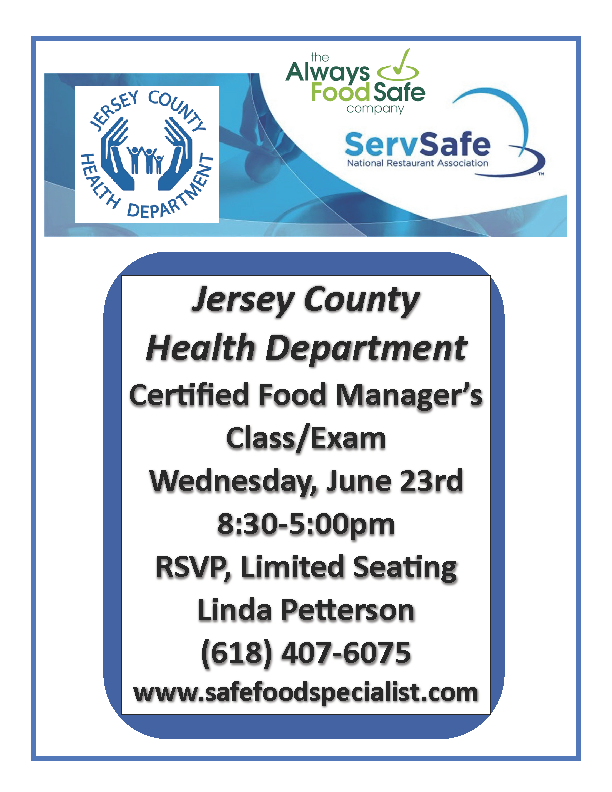ServSafe Manager Certification Training: What to Expect
How to Obtain Your Food Supervisor Qualification Swiftly
Acquiring your Food Manager Qualification effectively needs a systematic approach, beginning with a thorough understanding of the details requirements in your location. Many individuals neglect essential elements that can better quicken this procedure, which might substantially influence their accreditation journey.
Research Certification Needs

Aspiring food managers must initially determine which qualifications are acknowledged and requisite in their territory. This usually involves examining regional laws and policies that dictate food security practices and the certifications required for managerial placements. Understanding the eligibility standards, such as previous experience in food solution or relevant areas, is vital.

Select an Effective Educating Program
Selecting the ideal training program is a crucial step after identifying the qualification requirements in your location. The performance of your training can substantially influence your understanding of food safety and security principles, which are crucial for passing the certification exam. Begin by investigating programs recognized by trustworthy companies, such as the American National Standards Institute (ANSI), as these generally stick to market standards.
Take into consideration the training format that best matches your learning style. Options include in-person classes, on-line courses, or a hybrid approach. On the internet training courses supply flexibility, enabling you to study at your very own rate, while in-person sessions supply instant communication with peers and trainers. Review the curriculum to ensure it covers key subjects such as foodborne health problems, sanitation, and risk-free food taking care of methods.
Look for reviews and testimonies from previous individuals to evaluate the program's performance. In addition, ask about the credentials of the trainers, as knowledgeable trainers can supply useful understandings. Verify that the program consists of thorough products and resources to aid in your understanding. By carefully choosing a training program that straightens with your requirements, you can enhance your prep work for the food supervisor qualification exam.

Get Ready For the Exam
Use study materials that straighten with the test's structure. Lots of organizations offer research guides and technique examinations, which can be very useful in assessing your understanding and preparedness. Involve in active discovering strategies, such as flashcards or seminar, to enhance retention of important info.
Additionally, take into consideration going to review training courses or workshops that supply thorough coverage of important topics. These sessions commonly include professional understandings that can make clear complex principles and reinforce your understanding.
Arrange Your Examination Date
Choosing the ideal time to schedule your examination date is an essential action in the accreditation process. Selecting a proper day allows you to assign adequate time his explanation for preparation while stabilizing other personal and expert dedications. Consider your existing work and any kind of upcoming occasions that might sidetrack you from concentrated research study.
Goal to arrange your exam after finishing your preparatory coursework and practice tests. This guarantees you feel great in your expertise and abilities. Additionally, think about scheduling your exam for a day when you are generally at your most alert and concentrated, as psychological quality can dramatically influence performance.
It is additionally smart to examine the availability of test slots in your area, as some places might have limited openings. Scheduling your exam well beforehand can help you secure a preferred discover this time and area. In addition, understand the accreditation's expiration plans, as selecting a date too far in the future may lead to a gap in your understanding.
Eventually, the goal is to discover an equilibrium between readiness and schedule, ensuring you approach your exam with self-confidence and a solid structure of expertise.
Maintain Your Accreditation
Preserving your qualification is necessary for making sure recurring proficiency and conformity in food administration practices. Accreditation typically requires renewal every 3 to 5 years, depending upon the releasing company. To remain current, it is essential to recognize the specific renewal demands of your accreditation body, as they may vary.
Proceeding education is a key component of preserving your certification (Certified Food Manager Certification). Joining workshops, workshops, or online training courses associated with food safety and security, health, and management practices not just boosts your understanding yet may likewise fulfill renewal needs. Furthermore, many qualification companies provide sources and training sessions to aid you remain educated concerning the most recent market requirements and laws
Exercising excellent food management within your workplace is similarly crucial. Regularly using your understanding and skills reinforces your proficiency and may give documents that shows adherence to ideal techniques.
Last but not least, maintain track of your certification's expiration day and any type of needed documents for the revival process - Certified Food Manager Certification. Proactively handling these components will certainly make sure that you maintain your accreditation without disturbance, permitting you to continue supplying efficient and secure food monitoring in your professional setting
Verdict
Accomplishing Food Supervisor Qualification effectively demands a strategic approach that consists of comprehensive research of regional needs, option of an ideal training program, and weblink diligent prep work for the assessment. By adhering to these outlined actions, people can successfully browse the accreditation procedure and enhance their specialist credentials in food administration.
The path to obtaining food supervisor accreditation is not consistent; it varies significantly depending on local guidelines and the particular qualification program selected. The effectiveness of your training can substantially affect your understanding of food safety concepts, which are essential for passing the accreditation test. By thoroughly picking a training program that lines up with your needs, you can improve your prep work for the food manager certification examination.
Comprehensive preparation is crucial for success on the food supervisor certification test.Accomplishing Food Manager Accreditation successfully necessitates a tactical technique that consists of thorough research study of regional requirements, selection of a proper training program, and thorough preparation for the evaluation.